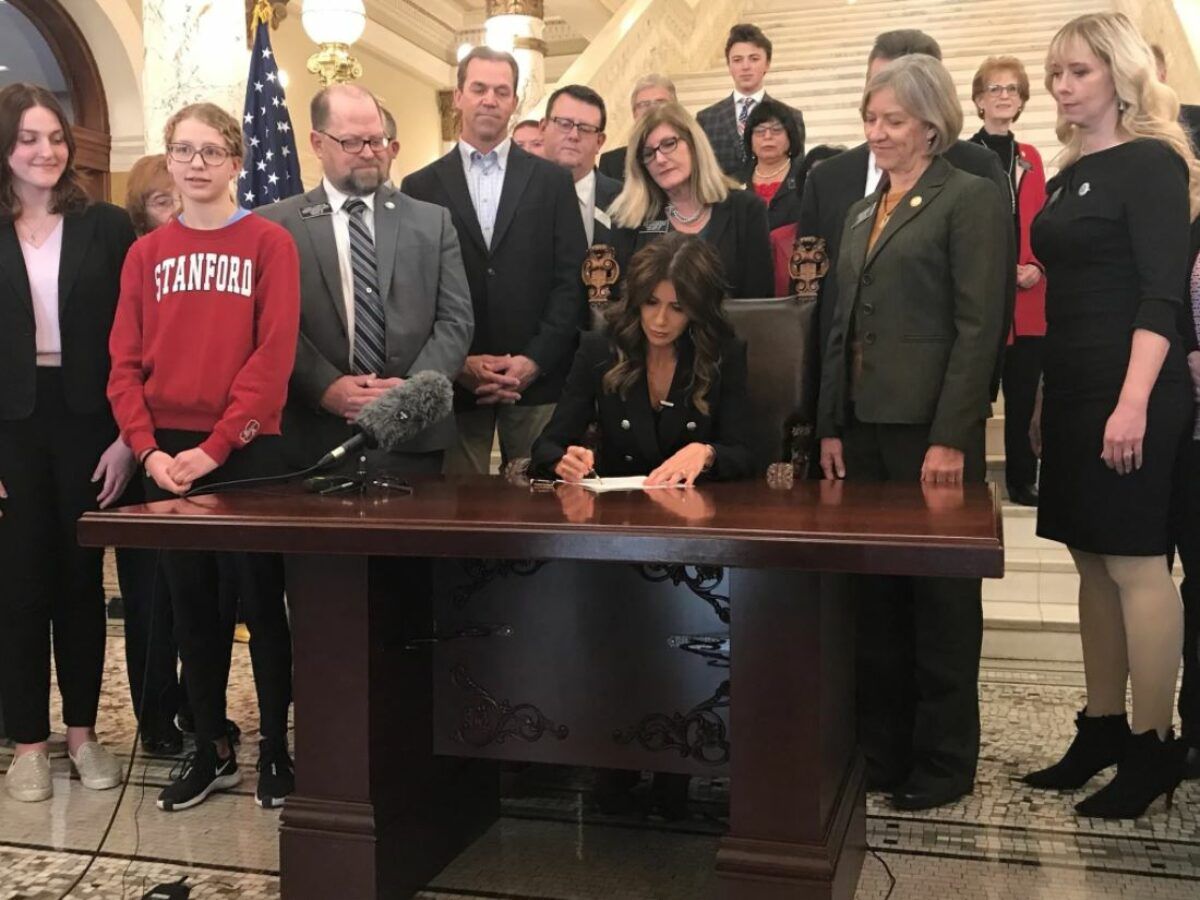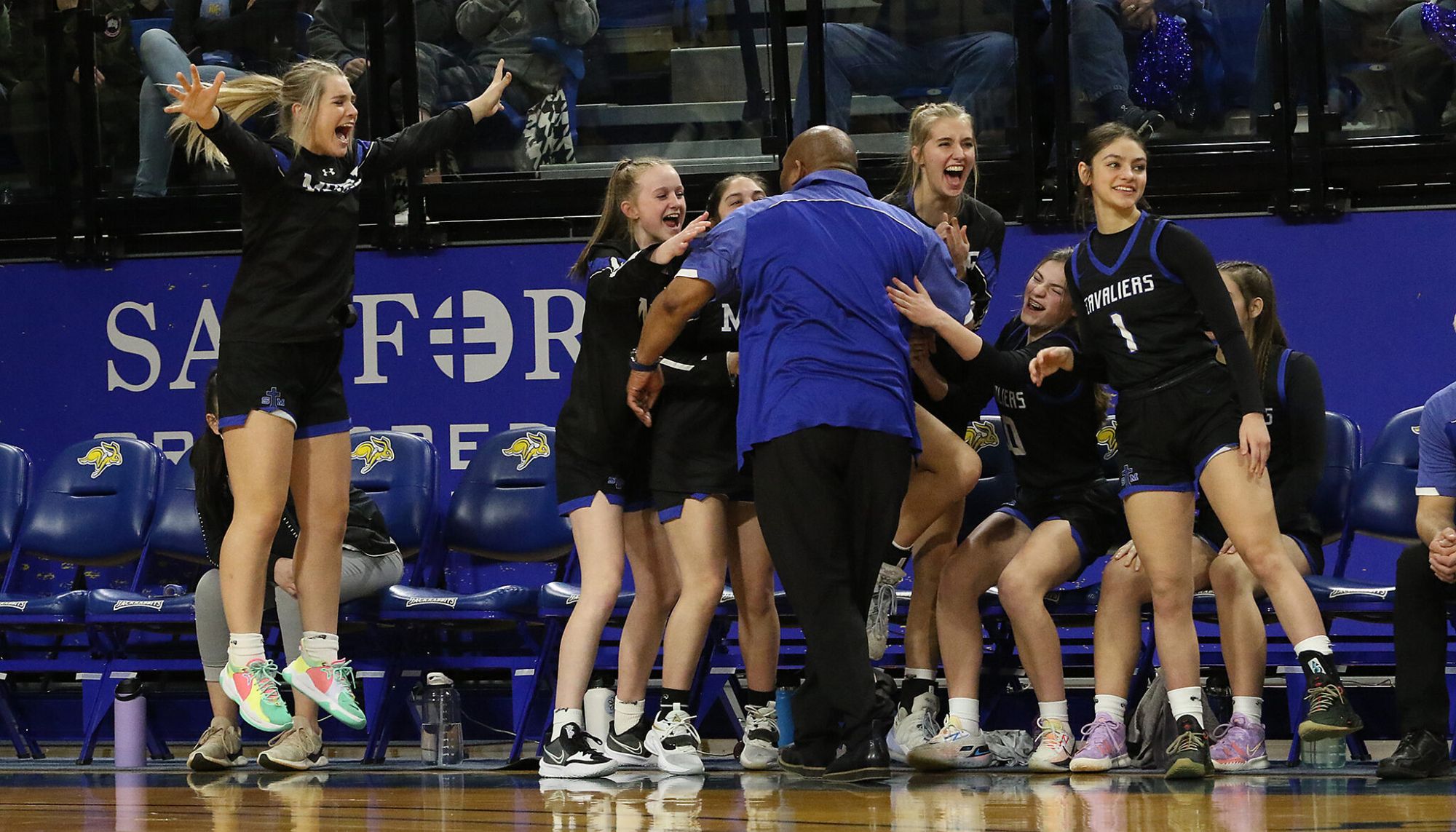Much of the political momentum behind South Dakota’s transgender sports ban, signed into law by Gov. Kristi Noem in February, can be traced not to the legislative process in Pierre but to national athletic competitions and the controversy involving University of Pennsylvania swimmer Lia Thomas.
Thomas swam collegiately as a male before transitioning and competing as a female in 2021-22 after undergoing hormone therapy. She eventually became the first openly transgender athlete to win an NCAA Division I championship in any sport. Her success was seized upon by conservative politicians and media as proof that “boys competing against girls” was a threat to competitive fairness in female athletics.
In South Dakota, one of several battleground states over transgender rights, getting Senate Bill 46 passed and signed into law was not as much a story of who fought for the measure as a matter of which groups did not argue against it, with the Lia Thomas situation changing the narrative.
“It struck a chord,” said lawyer and lobbyist Dave Zimbeck, who represents the Sioux Falls Sports Authority, one of several organizations that publicly opposed transgender sports legislation in 2021 but which stayed out of the fray this year. The group’s strategy changed due to shifting public sentiment and the belief that the National Collegiate Athletic Association, which stages championship events in South Dakota, no longer plans to pull events from states that pass transgender legislation.
“Lia Thomas came along and Fox News and other outlets made her the poster child for their cause,” said Zimbeck, whose organization works to lure sporting events to Sioux Falls in conjunction with First Premier Bank and Sanford Health. “A lot of people who were in the middle on this issue saw the physical stature of (Thomas) and her success and had trouble getting past that. We made the decision that there was a lot of futility in jumping in and taking a big stand, that this thing was on a fast track to approval.”
South Dakota is one of 12 states that have passed laws that ban transgender females — people born as males who transition to females — from competing in women’s and girls’ sports, with SB 46 set to take effect July 1.
These types of legislation have sparked a national debate about the balance between inclusivity and competitive integrity, as well as on the scope of civil rights for transgender students.
Organizations such as the South Dakota Board of Regents, South Dakota Chamber of Commerce, Greater Sioux Falls Chamber of Commerce and Visit Rapid City also remained neutral this year after previously working to defeat transgender sports bans. In 2021, these groups played a role in Noem refusing to sign House Bill 1217 despite the Republican governor earlier declaring support for the measure, a reversal that drew heat from far-right conservatives in South Dakota and nationally.
At this year’s session in Pierre, when Noem brought her own bill and touted it as protecting fairness in female sports, she encountered less resistance.
Critics called it a solution without a problem, since South Dakota has had one transgender female compete in high school sports since the state activities association adopted its transgender policy in 2013. Yet the threat of repercussions from a business perspective had lessened.
“What’s different from prior years is the inaction or ambivalence of the NCAA, as evidenced by the growing number of states that have passed legislation with little or no consequence,” said Nate Lukkes, general counsel for the South Dakota Board of Regents, which oversees the state’s colleges and universities. “When you see states like Texas, Florida and Alabama passing laws and the NCAA not acting upon them, the fear of reprisal starts to get diminished and watered down.”

Caught in the middle
Sioux Falls is scheduled to host a Division I men’s hockey regional in 2024 and 2026, in addition to a Division II volleyball championship in 2024 and Division II wrestling championship in 2026. The city also hosts the Division I Summit League basketball tournament each year at the Denny Sanford Premier Center, with winners advancing to the NCAA men’s and women’s tournaments.
Despite the transgender sports ban, Sports Authority officials expect those events to stay in Sioux Falls, though future bid cycles could be in flux. “It’s a moving target right now,” Zimbeck said, citing the challenges faced by the NCAA to keep up with an evolving legal and cultural issue.
Educational organizations such as the Associated School Boards of South Dakota and the South Dakota High School Activities Association have consistently argued against transgender sports bans, pointing out that they run counter to federal Title IX guidelines and recent court decisions establishing transgender individuals as a protected group.
Title IX, passed as part of the Education Amendments of 1972, prohibits sex discrimination in educational institutions that receive federal funding. President Joe Biden’s administration issued guidance last June saying that discrimination based on a student’s sexual orientation or gender identity will be treated as a violation.
“If you have state law on one side mandating a certain position and federal law and the courts seeing it differently, you’re in a difficult situation,” said Wade Pogany, executive director of the Associated School Boards of South Dakota. “When I met with school board members from across the state, their clear message was that they supported the process that the SDHSAA already had in place and that this issue had not been a problem at the local level.”
Nationally, though, Lia Thomas’ emergence after satisfying NCAA transgender protocols – which required testosterone-suppressing drugs for a least a year prior to women’s competition – moved the political meter. A 2021 Gallup poll showed that while 66 percent of respondents favored allowing openly transgender men and women to serve in the U.S. military, only 34 percent said that transgender athletes should be able to play on teams that match their new gender identity.
As public opinion shifted, so did the NCAA. The organization changed its policy in January to require transgender athletes to meet testosterone thresholds set by the governing body of each separate sport, while also remaining quiet on punitive measures against states that passed transgender laws.
Gail Dent, the NCAA’s associate director of communications, wrote to South Dakota News Watch in an email that “there is no additional information to share at this time” regarding potential boycotts. She also shared a link to the association’s revised transgender participation policy.
For transgender rights activists seeing a wave of restrictive legislation in statehouses around the country, the silence of the NCAA is deafening.
“The NCAA is faltering and backtracking in terms of articulating what its stance is,” said Shannon Minter, a transgender legal expert with the National Center for Lesbian Rights in San Francisco. “They’ve caved to political pressure and tried to remove themselves from the responsibility of having their own policy by punting to these various sanctioning bodies, which is very disappointing.”

Legal uncertainties loom
The South Dakota High School Activities Association drafted its policy for transgender athletes in 2013, responding to a recommendation by 77 percent of superintendents in a statewide survey. The move came in reaction to guidance from the Office for Civil Rights under the Obama administration that transgender status was protected under Title IX, not just in theory but in legal actions taken by the Department of Justice.
The SDHSAA policy required that transcripts and family statements be submitted to “prove” that a student has an affirmed gender identity other than the one assigned at birth, with an independent hearing officer (such as a judge or current member of the state bar) available to review submitted information before rendering a decision.
SDHSAA Executive Director Dan Swartos said the organization has had one transgender female athlete go through the system (she graduated several years ago) and fewer than five transgendered males out of 40,000 students who participate annually in high school sports in South Dakota.
“As it stands now, if a student comes and wants to compete as a transgender female, the school or student would contact us and fill out a waiver form and that would begin the process,” said Swartos. “After July 1, if schools contact us with a student wishing to file a waiver, we will refer them to state law and tell them it’s not allowable under the statute.”
The law is focused on preventing transgender girls from playing female sports, stating that “only female students, based on their biological sex, may participate in any team, sport or athletic event designated as being for females, women, or girls.”
The SDHSAA is working with its legal counsel to determine how to handle transgendered males competing in boys sports.
As for language in the law that mandates designating each sport as either female, male or co-ed “based on the biological sex at birth of the participating students,” Swartos said that football may need to be labelled “co-ed” to avoid excluding athletes such as a female Garretson High School student who kicked for the varsity team last fall.
Swartos, who testified against the legislation, is well aware that the Office for Civil Rights under President Biden asserts that banning transgender students from participating in extracurricular activities that correspond to their gender identity is a Title IX violation. Federal judges in Idaho and West Virginia have issued rulings that prevented such actions from taking effect, with appeals pending.
“It’s a little nerve-racking that we’re in a position where if we follow state law then we’re not following guidance from the federal government,” said Swartos. “It puts us in a position to violate one or the other.”
That conundrum could be costly, as the SDHSAA is not listed among the entities covered in the law’s wording that the “attorney general shall provide legal representation at no cost to that entity or individual.” In West Virginia, attempts by the state activities association to remove itself as a defendant in the lawsuit were denied by the judge.
Though South Dakota’s colleges and universities are covered under the law’s “hold harmless” clause for legal representation, they still have exposure. While the NCAA’s new policy uses testosterone thresholds from various governing bodies for eligibility, South Dakota’s law effectively bans participation for transgender student-athletes, putting the athletic departments in conflict with NCAA and Title IX provisions.
“There are uncertainties with respect to the legal landscape and how that will play out,” said Lukkes, the Regents’ general counsel, adding that the board knows of no current transgender athletes in the state university system. “For the time being, South Dakota, through this legislation, has decided what constitutes fair and equitable competition in this state, and that’s what our policy will be based on.”

“If you have state law on one side mandating a certain position and federal law and the courts seeing it differently, you’re in a difficult situation [and] when I met with school board members from across the state ... this issue had not been a problem at the local level.” -- Wade Pogany, executive director of the Associated School Boards of South Dakota
Preparing for court challenge
Those anticipating challenges to South Dakota’s law likely won’t have to wait long. Susan Williams, executive director of the Transformation Project, a nonprofit advocacy group in Sioux Falls, said several potential plaintiffs have emerged for a court challenge on Title IX and Fourteenth Amendment “equal protection” grounds.
“At this point, we have a couple of transgender girls who were planning on playing sports next school year,” said Williams. “There are a few East River and a couple West River. It’s a thing that had crossed their mind, like, ‘maybe I’ll try out for volleyball,’ or ‘maybe I’ll go out for gymnastics or play soccer with my friends.’ Of course, now that is out of the question. They’re pursuing all their options.”
It’s unclear which organization would handle the court cases if they come. National groups such as Lambda Legal, the Human Rights Campaign, the National Center for Lesbian Rights and the ACLU have been active on behalf of transgender rights.
Minter, of the lesbian rights center, said he believes the South Dakota law will be challenged in the federal Eighth Circuit Court rather than waiting to see how the Idaho and West Virginia appeals unfold. He also believes the lawsuit will be filed before July 1.
“The goal is to bring a lawsuit that prevents the discriminatory law from ever going into effect,” Minter told South Dakota News Watch. “We can’t just stand by and allow this type of extreme law that openly discriminates against an entire class of students to go unchallenged.”
The conservative-leaning composition of the U.S. Supreme Court has instilled confidence in some Republican circles that rulings on transgender civil rights will favor the new laws, but recent high-court decisions don’t support that assumption.
In 2020, the Supreme Court ruled in Bostock v. Clayton County that discrimination against gay or transgender employees falls under the protections of Title VII of the Civil Rights Act and should be classified as sex discrimination. Justice Neil Gorsuch, appointed by President Donald Trump, wrote the majority opinion.
That principle was extended from employment to the educational realm a year later in G.G. v. Gloucester County School Board, when the Supreme Court refused to hear a case involving a transgender Virginia student who had sued for being forced to use women’s restrooms despite identifying as male. That decision upheld a lower court’s ruling that the student’s protections under Title IX had been violated by the policy.
Mark Miller, Noem’s chief of staff, argued during committee hearings that the principle of Title IX protects female athletes from being denied opportunities because of transgender participation. The governor, whose office didn’t respond to a request for comment on this story, has characterized her support for the measure as a way to “protect Title IX” from being misused by the federal government.
But the Idaho judge, in ruling against that state’s transgender sports ban in 2020, challenged the claim that motivations behind the law aligned with Title IX, noting that transgender students have been historically discriminated against, not favored.
Zimbeck, who lobbied against South Dakota’s legislation for the Sports Authority in 2021, sees similarities between the Idaho case and South Dakota, where there is no evidence of girls or women losing opportunities to transgender athletes or competitive fairness being compromised.
“The whole concept that Title IX is the principle protecting (cisgender females) by putting this law on the books is disingenuous at best – and probably a flat-out falsehood,” Zimbeck said.

South Dakota seen as test state
South Dakota has frequently served as a testing ground for transgender legislation, with Christian groups such as Alliance Defending Freedom, the Family Policy Alliance and the Heritage Foundation providing bill language and testimony.
Some of these efforts drew national headlines, such as when the late South Dakota legislator Roger Hunt, R-Brandon, proposed in 2015 that high school athletes should undergo “visual inspections” to determine their gender as part of the eligibility process.
Rep. Fred Deutsch, R-Florence, a supporter of transgender legislation, apologized in 2020 for comparing gender reassignment procedures to Nazi medical experiments that occurred during the Holocaust. His bill to ban such procedures died in a Senate committee after drawing tepid support from Noem.
Deutsch was also instrumental in the 2016 Legislature passing a “bathroom bill” that would have banned transgender students from using restrooms and locker rooms aligned with their gender identity, instead segregating them by offering single-occupancy facilities or “controlled use” of restrooms or locker rooms. Critics derided the bill as discriminatory and potentially damaging to the state’s business interests.
When then-governor Dennis Daugaard, a Republican, weighed whether to veto the measure, the Sioux Falls mayor at the time, Mike Huether, and major employers Sanford Health, Citibank and First Premier Bank, expressed concern that adopting the law would put South Dakota in the crosshairs of powerful entities such as the NCAA.
“Our commitment to the fair treatment of individuals, regardless of sexual orientation or gender identity, has not changed and is at the core of what we believe,” the NCAA said in a statement at the time. “We’ll continue to monitor current events in all cities bidding on NCAA events, as well as cities that have already been named as future host sites.”
Daugaard ultimately vetoed the bill, citing liability concerns and adding that the measure “does not address any pressing issue concerning the school districts of South Dakota.”
North Carolina passed a similar law that was signed into law several weeks later, triggering a national backlash. Companies such as Adidas and PayPal reversed plans to invest in the state, the NBA removed its 2017 All-Star Game and the NCAA made good on its promise by moving several championship events to different sites.
The economic toll from those actions was not lost on other governors, including Noem, who mentioned the NCAA’s sway when explaining her decision to withdraw support for last year’s transgender sports bill in South Dakota.
“The NCAA is a private association,” Noem said at a press conference following her decision not to sign the bill. “That means they can do what they want to do. And even though I fundamentally disagree with them when it comes to this issue, if South Dakota passes a law that’s against their policy, they will likely take punitive action against us.”
Though Noem tried to rally support for a “Defend Title IX Now!” coalition, she was assailed by hard-core conservatives as a “sellout” who “caved” to corporate interests. In a contentious interview on Fox News, host Tucker Carlson asked her: “Why not just say, ‘Bring it on, NCAA. I’m a national figure. Go ahead and try and exclude us. I will fight you in the court of public opinion and defend principle.’ Why not just do that?”
The first-term governor took a more aggressive position for the 2022 legislative session. Her office put forth a retooled bill, removing logistical challenges for schools and adding a clause to provide legal representation from the attorney general for various entities in case they were sued.
Mainly, though, Noem rode a wave of shifting sentiment resulting from Lia Thomas’s collegiate swimming success. Not only did the NCAA soften its rhetoric about consequences for anti-trans sports legislation, but powerful interests within her own state stayed mostly silent.
The Sioux Falls Chamber, whose public policy director said the 2021 measure would “negatively affect the whole state,” declined to take a stand this time around, even with Amazon scheduled to open a fulfillment center in the city later this year.
“The Chamber engages in advocacy on policies that have the potential to impact the business climate in our city and state,” president and CEO Jeff Griffin said in response to emailed questions from News Watch. “We carefully reviewed the language in SB 46 and determined that we would maintain a neutral stance on the bill.”
Asked whether Amazon or any other company had weighed in, Griffin said his office is “not aware of any businesses that have voiced concern about this legislation.”
And yet, with public sentiment leaning in one direction and judicial precedents trending the other, the transgender sports issue is far from settled. The final evaluation of South Dakota’s latest foray into the culture wars will likely be determined at the end of a long and potentially expensive trail of appeals.
“This is going to have to be heard probably by the Supreme Court,” said Swartos. “Our approach has been, ‘Let’s wait for this to play out in the courts so we can get that ruling and base our policy on it.’ This year a different approach was taken, and you have to follow the legislative process whether you agree with it or not.”




